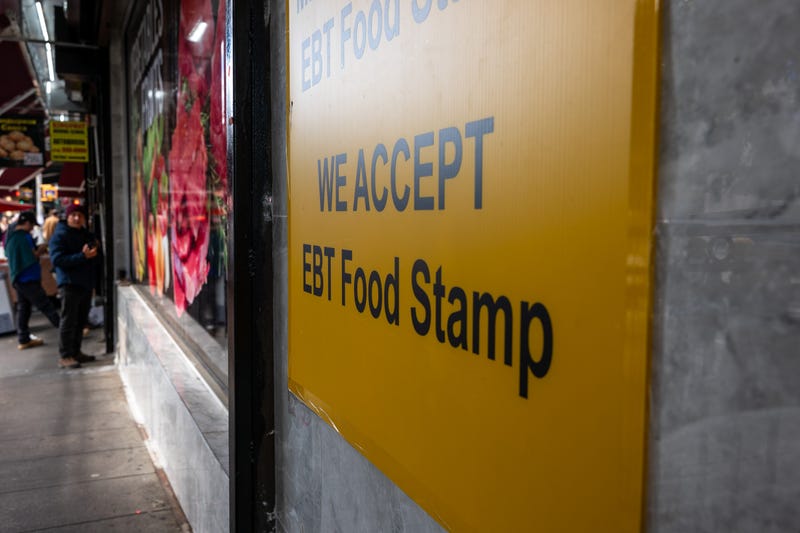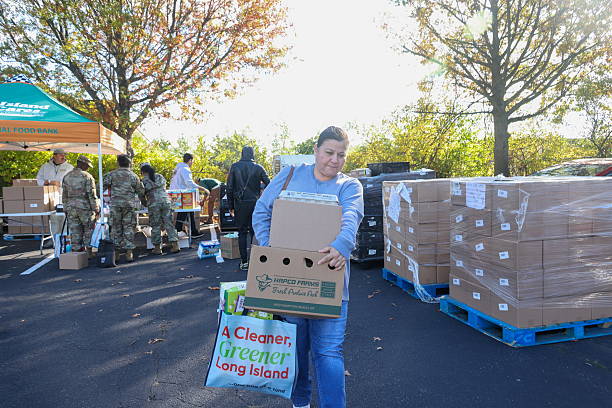
26 states including Minnesota are suing the U.S. Department of Agriculture.
The suit states the USDA is illegally cutting off food assistance to over 42 million Americans during the government shutdown.
WCCO spoke to Minnesota Attorney General Keith Ellison on Tuesday about this emergency request for a restraining order to stop the suspension.
"So the agency claimed that it had run out of funds, but we know and can prove in court that this is illegal and that there's deliberate refusing to use billions of dollars in SNAP specific contingency monies that are available, that Congress had already appropriated," Ellison explained.
More than 440,000 Minnesotans per month rely on the government assistance program for food.
“It is hard to be shocked by the cruelty and illegality of the Trump administration anymore, yet I am shocked that Donald Trump is deliberately allowing 440,000 Minnesotans, to go hungry,” said Ellison. “Congress put a rainy-day fund in place so nutrition support could continue during a government shutdown, yet despite that clear Congressional intent, Trump’s USDA is refusing to tap into that fund. It is a disgrace to the presidency that Donald Trump is using hungry children throughout Minnesota as bargaining chips in the fight over his government shutdown. His actions aren’t just cruel though, they are unlawful.”
On Monday, the USDA sent out a warning that the "well has run dry" for SNAP benefits and blamed Democrats for allowing the shutdown to continue.
If the shutdown prolongs into Saturday, November 1, it would mark the first time in 60 years there has been a disruption in SNAP - or formerly food stamp - funding.
"It’s my job to help Minnesotans afford their lives, and today that means taking the Trump administration to court to help feed people in need," Ellison added.
Over a million veterans depend on the program, while children and seniors make up nearly 60% of SNAP recipients.
Joining Attorney General Ellison in filing this lawsuit, which he co-led alongside the attorneys general of Arizona, California, and Massachusetts, are the attorneys general of Colorado, Connecticut, Delaware, the District of Columbia, Hawai‘i, Illinois, Maine, Maryland, Michigan, Nevada, New Jersey, New Mexico, New York, North Carolina, Oregon, Rhode Island, Vermont, Washington, and Wisconsin. The Governors of Kansas, Kentucky, and Pennsylvania have also joined.
Zach Rodvold is seeing first hand the effects of the government shut down and the looming crisis with SNAP benefits about the run out, working with Second Harvest Heartland.
"The USDA themselves have said that they've got $5 billion in a reserve account for SNAP benefits," Rodvold explains. "It also is short of the $8 billion that's needed to fund SNAP in this country for one month."
The Supplemental Nutrition Assistance Program, or SNAP, helps about one in eight Americans buy groceries. A halt to SNAP benefits would leave a gaping hole in the country's safety net. Vulnerable families could see federal money dry up soon for some other programs, as well.
Funding for a group of Head Start preschool programs is set to run out Saturday.
Aid for mothers to care for their newborns through the Special Supplemental Nutrition Program for Women, Infants, and Children, known as WIC, could run out the following week.
Here’s a look at what would happen.
Democratic officials sue
Tuesday’s legal filing from attorneys general from 22 states and the District of Columbia, plus three governors, focuses on a federal contingency fund with roughly $5 billion in it – enough to pay for the benefits for more than half a month.
President Donald Trump's Department of Agriculture said in September that its plan for a shutdown included using the money to keep SNAP running. But in a memo last week, it said that it couldn’t legally use that money for such a purpose.
The Democratic officials contend the administration is legally required to keep benefits going as long as it has funding.
The agency said debit cards beneficiaries use as part of SNAP to buy groceries will not be reloaded as of Nov. 1.
With their own coalition, 19 Republican state attorneys general sent Democratic U.S. Senate Minority Leader Chuck Schumer a letter Tuesday urging passage of a “clean continuing resolution” to keep funding SNAP benefits.

SNAP benefits could leave millions without money for food
Most SNAP participants are families with children, more than 1 in 3 include older adults or someone with a disability, and close to 2 in 5 are households where someone is employed. Most have incomes that put them below the poverty line, about $32,000 in income for a family of four, according to an analysis by the Center on Budget and Policy Priorities.
The average monthly benefit is $187 per person.
People who receive the benefits say that without the aid, they’ll be forced to choose between buying food and paying other bills. Food banks are preparing for a spike in demand that they’ll have to navigate with decreased federal aid themselves.
The debit cards are recharged in slightly different ways in each state. Not everyone receives their benefits on the first day of the month, though many beneficiaries get them early in the month.
States expect retailers will be able to accept cards with balances on them, even if they’re not replenished.
Some states seeking to fill void of SNAP benefit cuts
State governments controlled by both Democrats and Republicans are scrambling to help recipients, though several say they don’t have the technical ability to fund the regular benefits.
Officials in Louisiana, Vermont and Virginia have pledged to provide some type of backup food aid for recipients even while the shutdown stalls the federal program, though state-level details haven’t been announced.
More funding for food banks and pantries is planned in states including New Hampshire, Minnesota, California, New Mexico, Connecticut and New York.
The USDA advised Friday that states won’t be reimbursed for funding the benefits.
The Trump administration is blaming Democrats, who say they will not agree to reopen the government until Republicans negotiate with them on extending expiring subsidies under the Affordable Care Act. Republicans say Democrats must first agree to reopen the government before negotiation.
Early childhood education
More than 130 Head Start preschool programs won’t receive their annual federal grants on Nov. 1 if the government remains shut down, according to the National Head Start Association.
Centers are scrambling to assess how long they can stay open, since nearly all their funding comes from federal taxpayers. Head Start provides education and child care for the nation’s neediest preschoolers. When a center is closed, families may have to miss work or school.
With new grants on hold, a half dozen Head Start programs have already missed federal disbursements they were expecting Oct. 1 but have stayed open with fast-dwindling reserves or with help from local governments. All told, more than 65,000 seats at Head Start programs across the country could be affected.
Food aid for mothers and young children
Another food aid program supporting millions of low-income mothers and young children already received an infusion to keep the program open through the end of October, but even that money is set to run out early next month.
The Special Supplemental Nutrition Program for Women, Infants and Children helps more than 6 million low-income mothers, young children and expectant parents purchase nutritious staples such as fruits and vegetables, low-fat milk and infant formula.
The program, known as WIC, was at risk of running out of money in October because of the government shutdown, which occurred right before it was scheduled to receive its annual appropriation. The Trump administration reassigned $300 million in unspent tariff proceeds from the Department of Agriculture to keep the program afloat. But it was only enough for a few weeks.
Now, states say they could run out of WIC money as early as Nov. 8.
The Associated Press contributed to this story.
